By Olivia Doyle, UF/IFAS Center for Aquatic and Invasive Plants (CAIP) Communication Assistant
Plants are introduced to environments both intentionally and unintentionally for various reasons. More than 4,000 plant species are found in Florida and 1,300 of these are non-native or exotic meaning they have been introduced either from other states or other countries. Over 100 of these plants are spreading quickly through natural areas around the state of Florida. When these plants result in economic or environmental harm, they are considered to be invasive. Invasive plants can outgrow and replace Florida’s native plants and in return permanently eliminate Florida’s natural diversity. Invasive plants cost Florida millions of dollars each year to control.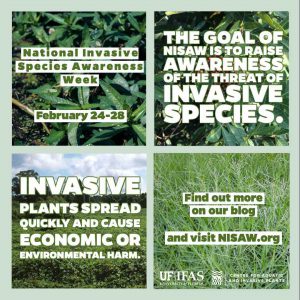 National Invasive Species Awareness Week is from February 24-28. The goal of this week is to spread awareness of invasive species and the impact they have. This week, we are highlighting four invasive plants affecting Florida, alligator weed, Brazilian peppertree, kudzu and torpedograss.
National Invasive Species Awareness Week is from February 24-28. The goal of this week is to spread awareness of invasive species and the impact they have. This week, we are highlighting four invasive plants affecting Florida, alligator weed, Brazilian peppertree, kudzu and torpedograss.
Alligator Weed – Alternanthera philoxeroides
Alligator weed or Alternanthera philoxeroides is an invasive non-native plant introduced to Florida in 1894 originating from South America. The plant has distinct white flowers that can be easily recognized in the warm months. Usually found in water, Alligator weed can form sprawling mats over deep rivers or along shorelines. These mats can cause a reduction in biodiversity or the variety of life in a particular ecosystem.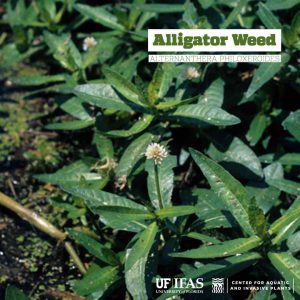
Brazilian peppertree – Schinus terebinthifolia
A non-native invasive plant originally introduced as an ornamental plant originating in Brazil, Argentina and Paraguay is Brazilian peppertree or Schinus terebinthifolia. This plant is widespread throughout Florida. Brazilian peppertree reaches over 30 feet in height and lives over 30 years. This plant aggressively invades areas and dominates natural spaces. In fact, over 700,000 acres in the state of Florida are infested.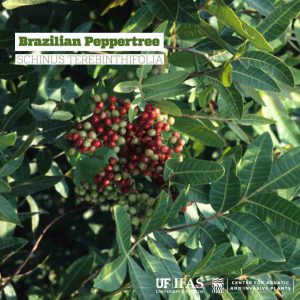
Kudzu – Pueraria montana
Kudzu or Pueraria montana is native to Eastern Asia and was introduced to Florida in 1899. In the southeastern United States, an estimated 2 million acres of forest lands are covered in kudzu. This plant is a semi-woody vine that once established will grow roughly one foot per day with the potential to reach up to 100 feet in length. This vine can grow over anything including plants, buildings and road signs. Kudzu kills other plants by blocking out sunlight reducing their ability to use photosynthesis to grow.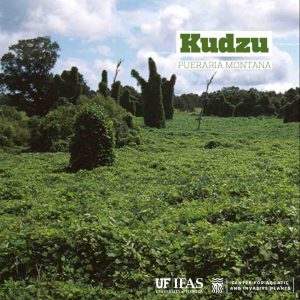
Torpedograss – Panicum repens
This plant was given its name for its torpedo like growing tips, Torpedograss or Panicum repens is an invasive non-native plant. Torpedograss had taken over 70% of Florida’s public waters by 1992. Management for this invasive plant costs approximately 2 million dollars per year in flood control systems.Torpedograss also causes major problems for both the citrus and golf course industries.
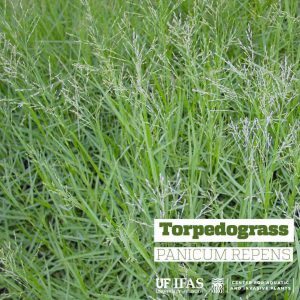
Invasive species are threatening to Florida and can have major impacts on both the economy and ecosystem. To learn more about invasive species during National Invasive Species Awareness Week, visit https://www.nisaw.org/nisaw-2020/. While there, sign up for webinars to learn more!
This piece was written by Olivia Doyle, the current UF/IFAS CAIP communication assistant. Any questions should be directed to Shelby Oesterreicher at 352-273-3667 or soesterreicher@ufl.edu For more information about the UF/IFAS Center for Aquatic and Invasive Plants please visit https://plants.ifas.ufl.edu. Be sure to follow us on social @UFIFASCAIP.
UF/IFAS CAIP, Turning Science Into Solutions.
 0
0
